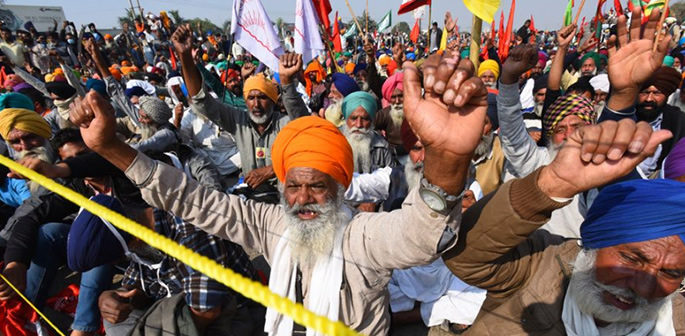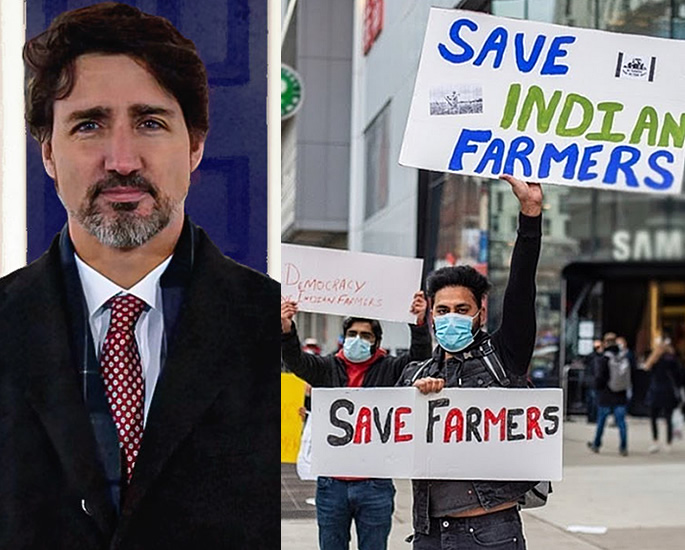"people's livelihood in this country is based on agriculture"
The Indian farmers protest in India has captured the interest of people around the world. Especially, those who have a major interest in their homeland.
The world’s media has been reporting on the rallies and marches taking place in India with thousands of protesting farmers heading for Delhi.
Though Punjabi farmers are at the forefront of the movement, protests involve Indian farmers from different states of the country such as Haryana, Uttar Pradesh, Bihar and many others.
Initially, on a local scale, protesting moved towards India’s capital, gaining worldwide traction.
Notable events include the ‘Rail Roko’ (‘stop the trains’) campaign, held by farmers on September 24, 2020.
Failing to garner the support of state governments, protestors headed towards Delhi to put pressure on the national government.
This ‘Delhi Challo’ march was accompanied a day of strikes across India on November 26, 2020, and almost 250 million people were involved.
Talks with the government on December 5 2020, failed to reach a solution, prompting further ‘Bharat Bandh’ (national) strikes throughout December 2020.
With the winter’s bitter cold hitting the capital and most farmers being elderly there have been at least 25 deaths during the protests.
But this is not deterring the protesters who have even staged hunger strikes.
According to the World Bank, Over 40% of India’s workforce is working in agriculture. Therefore, this is not a marginalised matter for the Indian farmers protesting.
So why is this all happening?
What are the New Laws?
Following discussions in the summer of 2020, these bills were passed in September 2020.
1) The Farmers’ Produce Trade and Commerce (Promotion and Facilitation)
Allows farmers to sell produce outside of the Agricultural Produce Market Committee (APMC) – government-controlled markets informally known as ‘mandis’.
Farmers will be able to trade in “any place of production, collection and aggregation”.
2) The Farmers (Empowerment and Protection) Agreement of Price Assurance and Farm Services
Enables farmers to enter agreements with buyers before any produce is physically yielded.
3) The Essential Commodities (Amendment) Act
Permits government regulation of produce. Food items like cereals, pulses, potatoes and onions may be declassified as essential, and no longer subject to stock-holding limits.
The contentious laws have received a mixed reception.
The BJP government maintain that these reforms are vital for the nation’s agricultural productivity. Modi described their passing as a “watershed moment”.
Supporters cite increased farmer empowerment and boosted private industry investment as the main positives.
Many are of the opposing view.
Bharatiya Kisan Union (The Indian Farmers Union) believe these reforms will put farmers “in danger of becoming captive to companies”.
“Anti-farmer” is a term increasingly used to describe these reforms, including by BJP ally Shiromani Akali Dal.
Therefore, these new laws have created a major reaction amongst Indian farmers which has led to this mammoth protest.
One big point of anger amongst Indian farmers is that there was no adequate consultation for these laws.
What do Protesting Indian Farmers Want?
Farmers are very uncertain of their future based on these laws and strongly feel that the laws will not bring fruition for their labour.
A farmer from Punjab being interviewed said:
“First of all, people’s livelihood in this country is based on agriculture.
“That’s why people are scared that if they [government] control this food market, they will buy our crop at whatever price they want and they will see at whatever price they want.”
Another young farmer said that he was very scared for his future and that farmers with land “under ten acres” will die.
There are some key demands the Indian farmers are protesting for. All of these are at the heart of how they feel the new bills will change their livelihoods.
Minimum Support Price (MSP)
The main contention is that Indian farmers want the Minimum Support Price (MSP) to remain in place.
The MSP acts as a safety net for farmers. It ensures that farmers are paid a promised amount for their produce.
This stands regardless of any wider issues i.e. a drastic fall in crop prices. By removing price uncertainty, it incentivizes farmers to grow all sorts of crops.
The problem is that the new bills fail to address the MSP.
The government has denied that the MSP will be abolished, and have even issued a written proposal assuring the MSP.
Many farmers remain unconvinced though. They fear they will be left vulnerable to exploitation by the private players.
Harjit lives in Leicester. He is of a farming background and has fond memories of growing up on the family’s Nawanshahr farm.
Harjit fears the possible damage to farmer stability with the implementation of these laws.
“Initially, big corporations will lure farmers in with high prices for their produce.
“Over time, these private players will take advantage of the farmers, dictating business terms and paying out less.
“Farmers will be left without an assured price for their produce.”
No matter the new problems these reforms could trigger, the MSP structure is already flawed.
The MSP for all crops has been declining over the last decade, and in 2015 the Shanta Kumar Committee report found only 6% of farmers actually manage to achieve MSP in trade.
A more efficient MSP system is at the core of farmers’ requests.
Protect the Mandi Structure
On the surface, expanding the scope of trade seems beneficial for farmers. Economist Ajit Ranade sees this reform as a step towards “unshackling the farmer”.
However, if private companies become the dominant buyers, some predict the end of the APMC – and controlled, regulated selling of farmers’ produce.
Ajit stresses the importance of the mandi system being retained alongside any private trading.
Moreover, the dismantling of the mandi structure could have impacts beyond farmers’ livelihoods. States themselves will lose ‘mandi fees’, potentially hindering a whole region’s fiscal health.
Commission agents (‘arthiyas’) too will be out of employment. Arthiya operate as the crucial link between farm and market.
Their roles encompass produce preparation, managing auctions and acting as the bargaining power of farmers.
The government argue that removing middle parties will make selling smoother and more profitable for farmers.
However, Gurnaam Singh, former president of the Arthiya Association, Patiala insists: “We are not middlemen, we are service providers.”
One protesting farmer also explains:
“When I need cash-in-hand for my farming, maintaining my tractor, fertilising my crops, it is not Ambani or Modi I can go to. It is my arthiya.”
Arthiyas have historically received bad press. It is perhaps their high interest rates on loans to farmers that contributes to this poor reputation.
Nevertheless, they are another group of labourers potentially vulnerable at the hands of these laws.
Support for the Welfare of Farmers
2019 saw 10,281 farmer suicides, with Punjab, Haryana and Uttar Pradesh amongst those reporting the highest rates.
Notably, these states are the main hubs of protests, surely illustrating the magnitude of farmer discontentment.
Crop failure and consequent financial strain have driven many farmers into depression.
The profits of traditional crops are inadequate in sustaining families now. This is evident when you consider that almost 86% of farming households in Punjab are under debt.
Undoubtedly, the toll of the Covid-19 pandemic is likely to have only intensified pressures on farmers.
Agricultural policy expert Devendra Sharma identifies another factor – the corporatisation of farming.
He refers to other states where wholesale markets have been dissolved, and farmers have suffered. He says:
“Leaving farmers to the tyranny of the markets would be akin to putting the sheep before the wolf.”
Bihar Comparison
Bihar is a relevant case study. Some supported the withdrawal of ACMP, claiming these markets in Bihar were underused and fundamentally corrupt anyway.
However, it has led farmers to engage in cheap sales out of desperation and lack of storage facilities. Paddy sells for around Rs. 1000, well under the abolished MSP of Rs 1868.
Economist Abdul Qadir suggests that farming has over time, become a “non-viable” profession in Bihar.
Now, as protesting farmers camp at Delhi’s Singhu border, their experience has not been much better.
The ‘Delhi Challo’ march was met with serious resistance. Huge police blockades at Delhi’s border were erected to prevent protester entry into the capital.
Clashes between farmers and police erupted, with protesting hurling stones and throwing barricades into the water.
More disturbingly, police deployed tear gas and water cannons to deal with protestors.
Images of this have gone viral, interpreted as iconic representations of the protestors’ unwavering determination.
Harsh and bitter weather has made overnight conditions unbearable, especially for the elderly.
Of deaths linked to the protests, several have been a result of the freezing weather. The masses remain undeterred.
Farmer Surminder Singh says:
“I don’t care how cold it gets. Our struggle will continue until the laws are withdrawn.”
Tragically, Baba Sant Ram Singh ended his own life out of protest of these reforms. His suicide note declared the government as the root of the farmers’ problems.
The event sparked a massive political fistfight, with opposition Congress leader Rahul Gandhi tweeting:
“The brutality of the Modi government has crossed all limits. Quit stubbornness and immediately withdraw the anti-agricultural law.”
The loss of life should highlight the gravity of the situation. Irrespective of one’s opinion on the laws, it is evident that government cooperation is necessary.
Global Response
In such volatile and tense times, it can be difficult to find positives. Yet a beautiful product of these protests has been worldwide unity.
South Asian diaspora across the continents have worked tirelessly to raise awareness of the farmers’ pleas. Social media has been pivotal in exposing new and uninformed audiences to the goings-on in India.
Tom is of British White background. He says he has only learnt of the protests through his Punjabi friends and what they share on social media.
“There is loads of useful material on Twitter or Instagram – but it is all posted by normal people trying to do their bit; I haven’t really seen much from the big media names.”
“It is so crazy that they are some of the largest in the world, yet we have only started hearing about them on the news recently.”
Perhaps this minimal coverage has been catalytic in encouraging people to engage with the matter.
Those, especially from the Punjabi diaspora, have reacted by organising marches in rallies like UK, Canada, USA.
Rallies have been held from London and Birmingham to Sacramento and Brampton, attended by grandparents and grandchildren alike.
The generational gap has been bridged, with all ages keen to learn about the issue.
Nalisha is a university student from Leeds, but her grandparents are farmers in Punjab.
“I might be in a different country, but this problem is so close to home. It is the livelihood of my own family at risk.
“Talking to my grandparents in India is disheartening.”
“They genuinely fear the impacts of these laws.
“They are not fit enough to have gone to Delhi but they tell me they are so proud of the farmers marching for their rights.”
“I hope from outside India, we can put some sort of pressure on the Indian government to fairly cooperate with the farmers. “
In steps to generate tangible change from outside India, many are participating in fundraising.
These have financed necessities like medical supplies, laundry provisions and charging points.
Celebrity Support
Bigger names and celebrities often opt to stay schtum on controversial topics, but many have spoken out.
Diljit Dosanjh has been a prominent figure in the movement, active both on social media and at the frontline on Singhu Border.
His notorious spat with actress Kangana Ranaut began after she incorrectly identified and mocked an elderly lady participating in the protests.
Both sides soon got heated, with Diljit accusing her of spreading misinformation and Kangana labelling him a “bootlicker”.
The feud has culminated into something personal, with both engaging in videos and voice notes intending to agitate the other.
Nevertheless, this only highlights the intensity of feelings towards the protests – whichever end of the spectrum they may be.
Overwhelmingly though, celebrities have expressed solidarity with the protesting farmers.
Bollywood actress Priyanka Chopra tweeted her solidarity by saying:
“Our farmers are India’s Food Soldiers. Their fears need to be allayed. Their hopes need to be met.
“As a thriving democracy, we must ensure that this crises is resolved sooner than later.”
Singers Jazzy B, Ammy Virk and Honey Singh have been vocal, while Mankirat Aulakh and Amrit Maan have helped langar service at protest sites.
In support of farmers’ demands, Harbhajan Mann refused to accept the state government’s ‘Shiromani Punjabi’ Award.
Outside of India, boxer Amir Khan, cricketer Monty Panesar, music artists Steel Banglez and Maya Jama have all spoken on the protests.
Internal Affair
With reactions of support for the Indian farmers protest coming from abroad, the issue of it being an internal affair has been widely touted by the Indian government and ministers.
Canada’s prime minister Justin Trudeau spoke out in support of the Indian farmers requesting the right for a peaceful protest.
However, he came under fire for making such comments by India’s government requesting him to stay out of India’s affairs. In his response Trudeau said:
“Canada will always stand up for the right of peaceful protest anywhere around the world and we are pleased to see moves towards the escalation and dialogue.”
In the UK, many government ministers have expressed their concerns with 36 British MP’s signing a petition.
As a response to these requests of support, there are many Indians in India not happy with such ‘interference’ saying that other countries need to stay out of an internal affair.
However, Jasveer Singh of the UK Sikh Press Association said in the DESIblitz debate on the issue:
“It’s impossible for those that are kind of outside the country of India but connected to the country of India to stay out of it.
“Firstly from a Punjabi perspective, many of us are seeing our families involved in the protests out there.”
“Furthermore as well as seeing our families out there, a lot of us have land out there, that we either own right now or we will inherit, so this directly impacts us.”
There are still hordes of people who remain oblivious though, including UK’s prime minister Boris Johnson.
When MP Tanmanjeet Singh Dhesi in Parliament raised the Indian farmers protest to the PM, Boris’s reply chose to address the India/Pakistan border – a completely separate and irrelevant issue.
Many against the bills are also linking the laws in favour of key business families in India, especially the Ambanis and Adanis.
There are claims that land and warehouses have already been bought and built in order to store the crops of the farmers being produced under the jurisdiction of these bills.
Hence, the political will of the Indian government is being questioned. As a democracy, the government needs to listen to the people who have made their way to protest, if it stands for its people.
Therefore, raising awareness and better educating ourselves on the matter is for all concerned, irrespective of which side of the argument you are on.
Can it be Resolved?
The biggest question remains is if there can be any kind of resolution. Of course, Indian farmers want to see the government see their point of view but will the ministers budge or not?
The Modi government so far has not signalled any kind of retraction of the new laws.
The PM said his government is willing to address the concerns of the farmers and blamed opposition parties of spreading hate and scaremongering.
Meetings for a resolution have not materialised into any kind of mutual agreement and there is a stalemate.
Responding to the protests, Modi said:
“Our law may not be perfect. No law is perfect. We are willing to talk and fix the logical problems if explained reasonably.
“But there has to be dialogue. You can’t say no dialogue.”
In the DESIblitz debate, Dr Tejinder Pal Singh Nalwa, an Attorney at the Supreme Court of India, said:
“I have a strong feeling that probably the government is trying to test the patience of farmers.
“If they are able to continue with their protest, I have a feeling that the government will offer them some relief. I’m quite hopeful.”
However, there are many supporters of the governments aims with the new laws and with schemes to help farmers in debt introduced in the past, they feel confident it is the move.
Devinder Sharma told the BBC:
“The government brought in direct income support to farmers and it was a good step in the right direction.”
However, no real data exists to show if the schemes do work as well as predicted.
Therefore, with no real data, it cannot be said that these kinds of schemes and laws will help the man on the ground.
As more and more farmers join the protests. There is no doubt that they will not leave without getting some kind of justice in their favour.
Therefore, regardless of one’s political stance, any humanitarian issue, including the plight of the farmers, does deserve acknowledgement.

































































